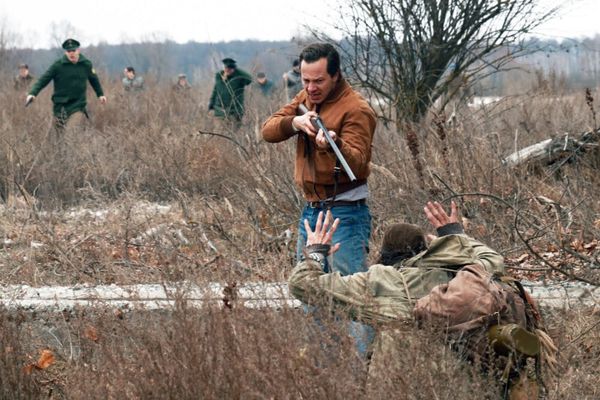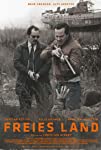Eye For Film >> Movies >> Free Country (2020) Film Review
Free Country
Reviewed by: Jennie Kermode

From the outset, the locals don't show much sympathy or concern for the missing sisters. "They liked to have fun. You know what I mean." says one.
"And you don't?" asks Patrick.

Patrick (Trystan Pütter) is a fish out of water. He's not only a city boy in a small town; he's a Westerner in the East. By taking Alberto Rodríguez's 2014 thriller Marshland and relocating it in Germany in 1992, Christian Alvart is able to explore a different set of political subsets. This is a country undergoing deep, fundamental change. The rules that Patrick is used to don't apply. The men he meets are preoccupied with competing for status, or possessed of a lingering fear of those who wielded power under the old regime. The women are cowed and reticent, many dreaming of getting out, building new lives in the west - yet this desire for escape has made them all the more vulnerable.
Keeping Patrick company as he investigates the death of the sisters - and sharing his hotel bed, after a mix-up - is Markus (Felix Kramer), an Easterner who is quick to resort to violence as a means of extracting information or simply giving suspects a hard time. The two distrust each other at first but gradually become friends as the investigation progresses, an old trope that's complicated in this case by Patrick's increasing suspicions about Markus' Stasi past. In keeping with his previous work, Alvart invites us to find little islands of hope and warmth in an otherwise grim scenario, only to undermine them.
The plot here, whilst it provides enough twists and turns to satisfy most murder mystery fans, isn't really the point. There's a lot more going on around it as Alvart explores the way that old power networks clung on in unofficial form, with government-sponsored structures giving way to gangster hierarchies (if, indeed, they were not the same thing all along), and the way that class structures continued to exist under Communism, easily adapting after the fall of the Berlin Wall. The film also looks at the particular importance of civilisation for women and children, and at the ways that women cope in times of chaos by turning a blind eye or directly colluding with male abusers. When the two detectives go drinking, women flock to the middle aged, overweight Markus, whose body language communicates his status, the entitlement that his past has given him.
There's also a supernatural dimension to the film, which is screening as part of Fantasia 2020, though it doesn't factor directly into the plot. Though Patrick keeps missing the signs, Markus is clearly very ill, perhaps with cancer, perhaps with the legacy of guilt. He keeps seeing crows, ancient harbingers of doom. A ferryman's wife rumoured to be a psychic regards him vim very directly, gives him a warning. I the absence of other forms of justice, the shadow of folklore looms large.
Full of complex, compelling characters, Free Country is a stubbornly uncomfortable yet intriguing piece of work. Alvart is careful not to exploit the story of the missing girls, who seem simply to have been born in the wrong place and time. A single statement made towards the end tells us all we need to know with the appropriate level of bitterness. For the most part, the horror here is more abstract: a reflection on what people do to each other when they feel they can get away with it, and on the damage it does, the poison that lingers long after the statues are toppled and the uniforms burned. It's a lament for all the victims of Erich Honecker's regime, a recognition that any justice now comes far, far too late.
Reviewed on: 17 Aug 2020















